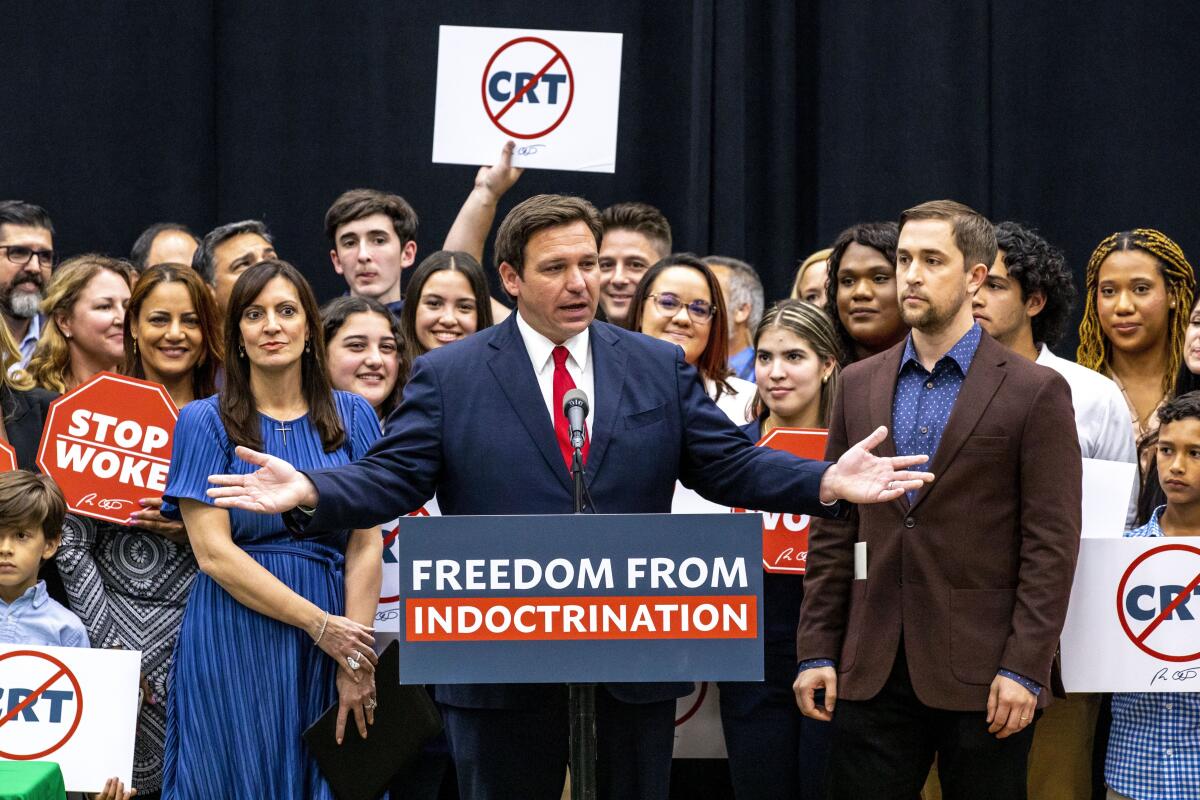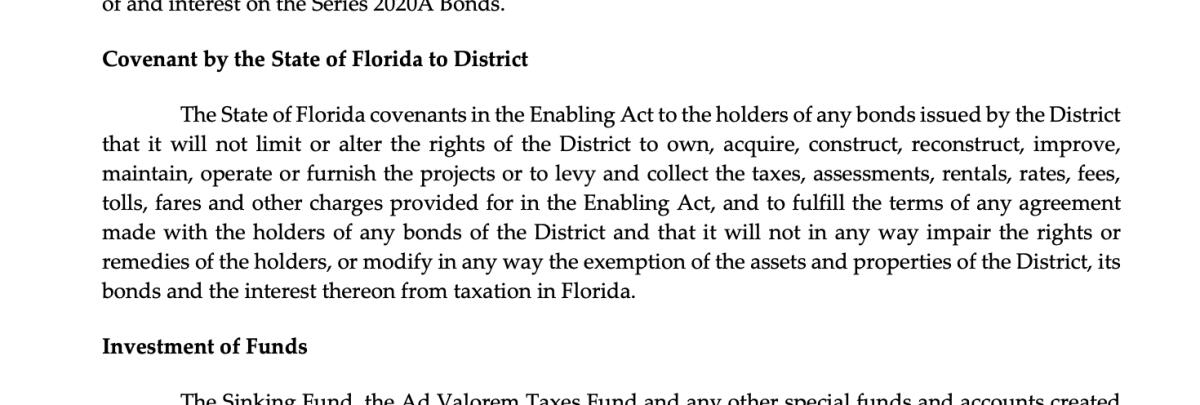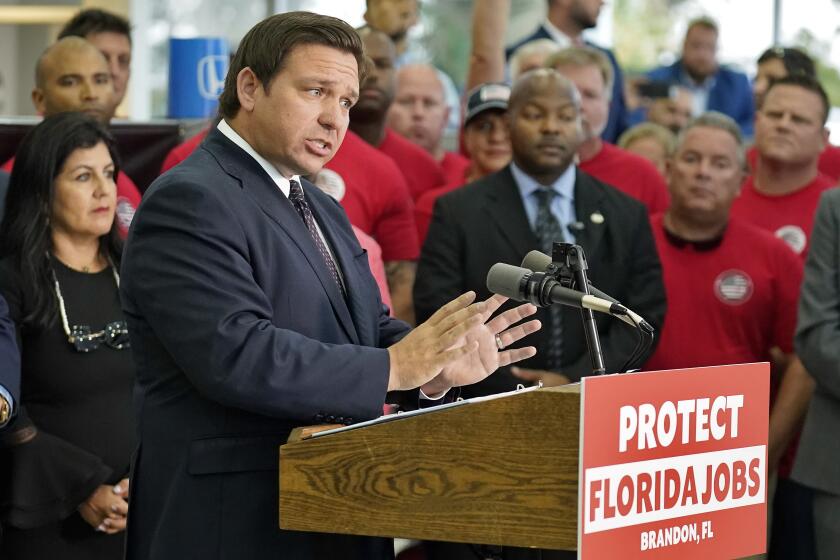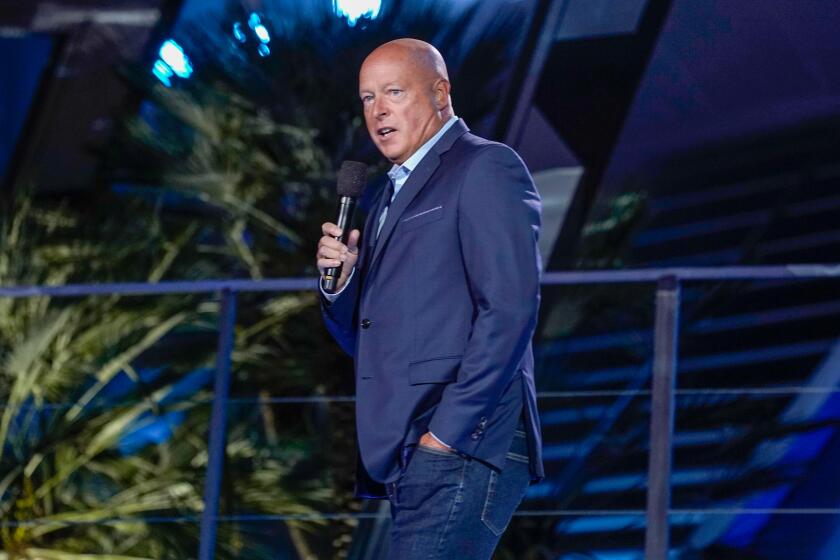In Florida, DeSantis punishes Disney — by giving it a big tax cut

- Share via
Up in their corporate suite, executives of the Walt Disney Co. must be laughing themselves silly.
They could only have watched in amazement as Florida’s Republican Gov. Ron DeSantis, pursuing his vendetta against the company for its opposition to his so-called “Don’t Say Gay” law, signed a measure that awards the company a tax break estimated at $164 million a year and stuck voters in the Orlando area with the cost.
The estimate comes from Scott Randolph, the tax collector of Orange County, Fla., where most of Walt Disney World and its associated theme parks and resorts are located. It’s the consequence of the law DeSantis signed that will dissolve the Reedy Creek Improvement District, a special district Florida created in 1967.
There could be a ton of expenses with no additional revenue to cover it.
— Orange County, Fla., tax collector Scott Randolph
The special district is what has allowed Disney to tax itself to build and maintain roads and provide firefighting, emergency medical assistance and utilities for the resort complex. Indeed, it’s considered the cornerstone of Orlando’s evolution into a world-class tourist destination over the following half-century.
According to the new law, Reedy Creek’s functions will devolve to Orange and neighboring Osceola counties. But the counties don’t have the money or the taxing authority to take on those responsibilities.
Get the latest from Michael Hiltzik
Commentary on economics and more from a Pulitzer Prize winner.
You may occasionally receive promotional content from the Los Angeles Times.
“There could be a ton of expenses with no additional revenue to cover it,” Randolph told the Orlando Sentinel. Some experts have estimated that property taxes in Orange County alone could rise by 25%, or several thousand dollars per household.
Whether the Reedy Creek dissolution will actually happen is anyone’s guess. Under the law, it wouldn’t take place until June 1, 2023, which leaves plenty of time for jawboning between Disney and Republicans in Tallahassee. “For most people down here,” says Aubrey Jewett, a political scientist at the University of Central Florida who has followed the conflict, “it seems unlikely that this is the final word.”
Indeed, in signing the bill April 22, DeSantis acknowledged that it might slam taxpayers, but said that wasn’t the “understanding or expectation” from the bill and hinted that there would be additional legislation to fill whatever potholes were created. That doesn’t speak well for the care that legislators ostensibly lavished on their handiwork the first time around.
We asked Disney spokespersons to comment on these issues, but they’ve remained silent.
As we reported earlier, Disney landed on DeSantis’ enemies list after the company publicly panned the Don’t Say Gay law, which suppresses teaching in Florida public schools related to sexual orientation or gender identification. Critics of the law, including members of the LGBTQ community, rightfully say it’s “meant to isolate, stigmatize, and erase LGBTQ families and [their] children.”
Disney cravenly remained silent about the law as it made its way through the Legislature and was signed by DeSantis. The company did, however, support every sponsor of the measure with campaign contributions, part of its extraordinary financial largesse to Florida politicians, including DeSantis himself. Disney’s cowardly silence provoked an uproar among the company’s employees, which finally prompted company executives to speak out.
That prompted the GOP-dominated Legislature, in turn, to enact SB 4-C, a hastily drafted law, during a special session this month. How hastily, you ask? The Legislature performed no fiscal analysis of its effects, or even an analysis of how it relates to other state laws or legal commitments the state has made. It was promptly signed by DeSantis.
Disney’s money has controlled Florida politics for more than 50 years. Now the politicians are showing their ingratitude.
Nor did the lawmakers offer any formal analysis for taking this action, leaving the obvious conclusion that they did so to spite Disney for its temerity in speaking out about the Don’t Say Gay law.
As a result, there is considerable confusion in Florida over how much the change will cost local taxpayers, how it will affect development on Disney’s property — the company owns pretty much all 27,258 acres lying within Reedy Creek’s bounds, or even how the Legislature’s action might produce a torrent of litigation.
Doubts about the measure’s legality stem from three issues. One is a preexisting Florida law stating that no special district such as Reedy Creek could be dissolved without the permission of owners of a majority of its acreage. Since that ownership majority belongs to Disney, that would appear to be a big obstacle to dissolution.
The Legislature finessed that problem by declaring that their dissolution would take place “notwithstanding” the earlier law. If push came to shove, it might be a fair bet that the company would take this issue to court.
Another issue is whether the state is within its rights to retaliate against a company for exercising its right of free speech.
It’s hard to gauge whether a challenge on these grounds would succeed, although courts have ruled in a multitude of cases that superficially legitimate government actions can lose their legal protection if they’re taken for illegitimate purposes, such as to discriminate against protected groups or infringe on constitutional rights.
A third obstacle is found nestled within the bond covenants of borrowings made under Florida law by Reedy Creek.
The bonds, of which nearly $1 billion is outstanding, typically include covenants that the state of Florida “will not limit or alter” Reedy Creek’s rights to “own, operate, build or maintain projects within its boundaries,” or “in any way to impair the rights or remedies” of the bondholders. That sounds as if bondholders might have the right to take Florida to court over any changes in Reedy Creek’s authority.

Thus far, investors haven’t spoken up, possibly because the legislation is so hurried and half-baked that no one has moved beyond the head-scratching stage. The credit-rating agency Fitch, which monitors the credit worthiness of municipal bond issuers like Reedy Creek, did place the district’s outstanding borrowings on negative rating watch after DeSantis signed the law April 22, however.
The warning applies to $766 million in Reedy Creek bonds backed by taxes and an additional $79 million in bonds backed by utility revenues.
Hiltzik: On Florida’s ‘Don’t Say Gay’ bill, Disney sets a new standard for corporate cowardice
Disney, Florida’s most powerful corporation, greets the state’s attack on LGBTQ+ kids with silence.
Fitch said it issued the warning due to “the lack of clarity regarding” the revenues pledged to cover the debt, thanks to the pending dissolution. Even if the debt is transferred to Orange and Osceola counties, Fitch said it believes “the mechanics of implementation will be complicated, increasing the probability of negative rating action.”
That would harm the price of the bonds and drive up the interest rate the district or the counties would have to pay to borrow money. Already, some Reedy Creek bonds have lost value.
District bonds that traded at $114.70 as recently as mid-February have been quoted in the last few days at $107.60, or a loss of more than 6% in market value. An increase in interest rates has forced the municipal bond market down generally in recent weeks, however.
There are lessons in all this, and they make DeSantis look like a sanctimonious fraud and Disney look like a hive of fools. DeSantis wasn’t above taking Disney’s campaign money to the tune of $107,000 in recent electoral cycles — not counting his take from Republican and conservative PACs to which Disney contributed.
Then Disney decided to challenge DeSantis’ campaign against LGBTQ people, undertaken quite obviously in pursuit of the GOP presidential nomination, and DeSantis saw the company as a winning target to please his far-right base.
Disney, for its part, spent more than $50 million over the last 25 years spooning up against Florida politicians, mostly Republicans, only to discover that it had provided cash by the pantsful to a limitlessly ungrateful gang of hypocrites. In a proper system, the company would have to take that $50 million as a charge against earnings, the way it has to take a charge for movies that don’t pay off. (Think of the $200-million write-down it took for the disastrous 2012 space flick “John Carter.”
On the other hand, the smart money may be thinking that the winner in all this will be Disney. It might shed itself of tens of millions of dollars in taxes that it pays now and can shift to other taxpayers while blaming Florida politicians for the fiscal catastrophe.
Disney might also find a way to get the Republicans to back off, perhaps by some face-saving change to the Reedy Creek Improvement District terms that will give DeSantis a rhetorical victory while not changing anything really important about Disney’s reign over its 27,000-acre Florida kingdom.
Florida politicians will be back at Disney’s door with their palms out for campaign handouts again, and maybe they’ll even be willing to sell themselves for a bargain price. They certainly haven’t shown that they’ve provided value for money this time around.
More to Read
Get the latest from Michael Hiltzik
Commentary on economics and more from a Pulitzer Prize winner.
You may occasionally receive promotional content from the Los Angeles Times.












